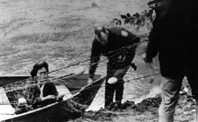The Nisqually Tribe and Indian Fishing Rights

| Treaty of Medicine Creek |
| Legislation |
| Boldt Decision |
Puget Sound area and Northwestern tribes
For over 100 years after the Treaty of Medicine Creek, Washington State courts debated the extent of conservation laws to limit Indian fishing rights.* The courts conceded that subjecting tribal fishermen to state regulations outside of reservations was not discriminatory, but necessary.
The experience Nisqually Indian fishermen had being targeted by law enforcement proved otherwise.
During the 1960s and early 70s, Nisquallys and other Puget sound area tribes protested against this degradation of their rights. The Boldt decision of 1974 eliminated legal precedents that restricted access to traditional fishing grounds, that resulted in abuse and violence by law enforcement and area citizens, and that limited native access to economic potential in commercial fishing ventures.
*Note: The term “Indian Fishing Rights” as used in this site refers only to the rights of enrolled members of treaty tribes. |


